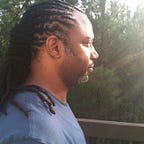An Appreciation For Brotherman
*Blog originally posted August 2009*
Comics have been a huge part of my life since I got my first Spider-Man comic at age 4. With comics the story/plot was what kept me interested in purchasing the next issue, but the artwork was what screamed for my attention. The artists became such a draw to me that over the years I began buying certain comics based on who was drawing the title at the time. John Bryne, Frank Miller, Jim Lee, George Perez, Todd McFarlane, and Joe Madureira have all managed to get me to plop down money just to follow whatever 10–12 issues they were drawing.
But one thing that had consistently troubled me was the lack of characters that looked like me. African-American. African. Of course there have been numerous black characters/heroes (a great site is World of Black Heroes ) , but they rarely had their own comic or played more than a supportive role. Of course Storm and The Black Panther are well-known, but there was still a desire for me to find someone to identify with.
Another issue of mine was the way Black characters were drawn. ALL of us had the same shade of walnut brown; with the men having the generic ‘fro, and the women looking like Sue Storm dipped in chocolate. There was no fashion sense (lol), and it was obvious to me that the artists and editors were too lazy or indifferent to care.
In April 1990 I was introduced to Brotherman: Dictator of Discipline and was hooked IMMEDIATELY. Independently published (Big City Comics), the comic was the brainchild of the Sims brothers, Guy A. Sims (writer) and Dawud Anyabwile (artist). The hero, Antonio Valor is a public defender for Big City who decides to take matters into his own hands after he becomes frustrated with the justice system. You know the rest.Years before The Boondocks, Brotherman was witty and slipped in social commentary between jokes (or disguised as jokes). The comic was able to capture a great slice of African-American culture; everything from dialogue to appearance (unlike some characters from the big three publishers).
Quick disclaimer:
Throughout the 90s there were other comics published independently by other African-American artists, and while I appreciate their Hustle, either the artwork or story (or both) didn’t move me.
Anyabwile was obviously influenced by the form and creativity found in graffiti. Just take a glimpse at the first page of issue #4.
The artwork and story only got better with each issue and I’m grateful that my local comic shop Oxford Comics carried the title. Black folks were THE characters, I cracked up at the dialogue, and the artist would frequently place something in the background that spoke to Hip-Hop culture. And yes I realize that the pages were in black & white, but I didn’t care (lol).
Exactly when Brotherman’s distribution slowed/stopped I don’t know. When I couldn’t find a follow up to the last issue I purchased I was extremely disappointed. But my disappointment was directed at the business side of comics and not the creators of the book. I knew it was difficult and expensive to publish independently so I’m sure “difficult” was an understatement behind the scenes. Needless to say, I found myself searching in many a bookstore/comic shop for ANY of the books. Eventually I charged it to the game and added my set to the comic collection; sealing Brotherman away in plastic covers.
Fast-forward to the summer of 2009. One of my “crew members” remembered my rambles about Antonio Valor and referred me to a youth workshop and viewing hosted by Big City Entertainment. I snatched up my reluctant sons and rolled to the Art On 5 Gallery here in Atlanta. Called “Drawing From The Soul: The Official Brotherman Comics Retrospective”; both Dawud Anyabwile and Guy Sims presented the business side of creating/publishing as well as a slideshow of Brotherman artwork.
Following the presentation, fans were able to walk through the gallery and view the artwork for themselves. The “Monsters” (my kids) were surprised that they enjoyed every minute of it. Their old man was just as excited as his sons, and couldn’t wait to get his #1 autographed (lol).
I’m proud of Big City Entertainment and also proud that my sons were exposed to something that the average fan would have had to pay BIG MONEY to attend at Comic-Con. They needed to see that they can create anything if they work hard and persevere, and that there are heroes that actually look and sound like them.
It will take some serious Indiana Jones expeditions to find the original comics, but the paperback and hardcover volumes are available at BrothermanComics.com or Amazon. Big City has plans for Brotherman to return to publication so I encourage everyone to see why, “Everything’s Gonna Be Alright!”
*UPDATE-Big City Entertainment has now released the Brotherman Graphic Novel*
